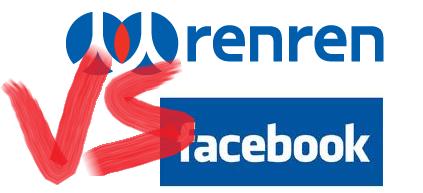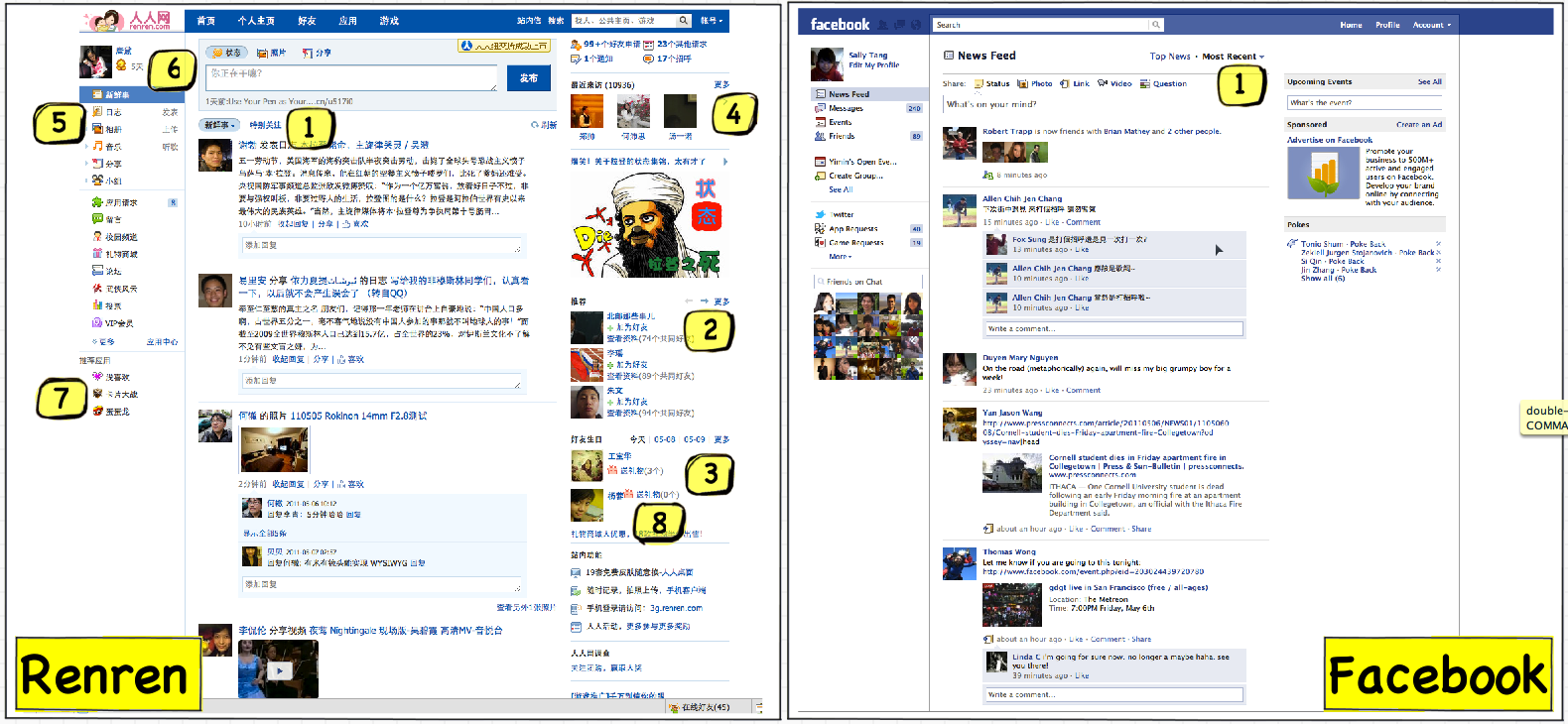 Renren, dubbed “the Facebook of China” went public in the U.S. IPO market last Wednesday, and quickly caused a lot of market buzz. The Chinese company is founded in 2005, and one of the founders was actually a Chinese student who graduated from University of Delaware. Very similar to Facebook, it started out in a few universities in Beijing and soon expanded its market to the whole country, and by Feb 2011, it had accumulated 160 million registered users.
As a user of both SNS (Social Networking Service) platforms and a UX professional, I’ve always wanted to do an apple to apple comparison between them in terms of their UX focus and motivational strategies. Renren’s not the only SNS platform in China. I am sure there are more reasons than just simply “copying Facebook” that would explain the fact that it’s the most successful SNS (so far) in China. Here's a look inside the platform similarities - and their differences.
Renren, dubbed “the Facebook of China” went public in the U.S. IPO market last Wednesday, and quickly caused a lot of market buzz. The Chinese company is founded in 2005, and one of the founders was actually a Chinese student who graduated from University of Delaware. Very similar to Facebook, it started out in a few universities in Beijing and soon expanded its market to the whole country, and by Feb 2011, it had accumulated 160 million registered users.
As a user of both SNS (Social Networking Service) platforms and a UX professional, I’ve always wanted to do an apple to apple comparison between them in terms of their UX focus and motivational strategies. Renren’s not the only SNS platform in China. I am sure there are more reasons than just simply “copying Facebook” that would explain the fact that it’s the most successful SNS (so far) in China. Here's a look inside the platform similarities - and their differences.
C. Notes vs. Status
5. Notes vs. Status A long time Facebook and Renren user recently asked me, “why doesn’t Facebook have the "note" function that Renren has?” The fact is that Facebook does have the note feature too, it’s just very few users use it. Renren puts the function up on the news feed page, whereas on Facebook, you have to be on the profile page in order to see it. I am not quite sure if it’s a cultural or a linguistic thing. Facebook users tend to use photos or short status messages to express themselves. If they have long thoughts and comments, they would perhaps use blogs instead. Renren users tend to mix their use of SNS and blogs. In fact, SNS is indeed a blog to some users in a sense. Further, I suspect to Chinese users, the concept of the independent blogger is still vague. To them, writing to their friends is a much more concrete and intuitive concept as opposed to writing to whoever in this online world.D. Value-added Service vs. Free
This might sound fairly strange to Facebook users: imagine you could pay extra money to buy a kind of virtual currency. By using that, you’ll be able to decorate your Facebook wall and profile page, buy virtual gifts to send them to your friends or even, add a little star or flower to show up near your name. Does that sound like something you would want to spend your real-world money on?
Of all these times, Facebook is FREE to its users, whereas Renren started to develop its various kinds of value-added services very early.
6. Visit award & 7. VIP Background If you visited your profile page frequently enough, you’ll accumulate your levels and earn badges on Renren, and the badge will show up on your profile. A SNS badge shows up you are a frequent user of this SNS. Perhaps due to the large population in China, Chinese people always live in this crowded and packed social space, so in this online world, they are looking for this sense of uniqueness. One way they achieve their goal is to differentiate themselves from other Renren users, starting from their own profile page. I doubt if any Facebook users would like to "decorate" or "differentiate" their profile page from other people, unless its a business or event page. More to that, I seriously doubt if any Facebook users would like to earn a badge because they are "frequent Facebook visitors." But, on the other side of the planet, people not only want to do that, they are paying money for it! 8. Buy gifts for your friends If you think a sentence of “happy birthday” on the Facebook wall is too cheap, would you want to spend money and buy your friends virtual gifts then? Or you would prefer to click on Amazon, to “actually” buy something?Overall Experience
As a user on both platforms, my opinions are largely skewed by the different social circles I have on these two SNSs. If purely based on the UX style, I enjoy using Facebook due to its clean, organized and minimalist style interface. The consistent color scheme, fonts and grouped friends pictures make the navigation, information search and creating posts much easier, which is probably why I am able to glance at the latest content on my Facebook feed in less than 1 minute, but on Renren, it usually takes up to 5 minutes.
But we do not design for the sake of design. We create a unique experience through design for our users. In that case, the friend-based motivational strategy, the mutual attention visit record, the note based information sharing mechanism as well as the various seemingly weird value added services are exactly the secret ingredients Renren used to create this unique experience for its users. It seems to have worked well. Will it continue to work in this ever changing social media landscape? Maybe more for Facebook, as the US society's comparatively speaking more stable (in terms of ideology and cultural values), whereas China's still in this rapid changing times, Renren's under the higher risk of being this "generation" thing. 5 years later or even sooner, when the kids born after 2000 start to take over the online world, Renren has to try very hard to retain its popularity. Good luck with that, here's hoping the IPO of Renren won't ultimately become another round of the Internet bubble.
